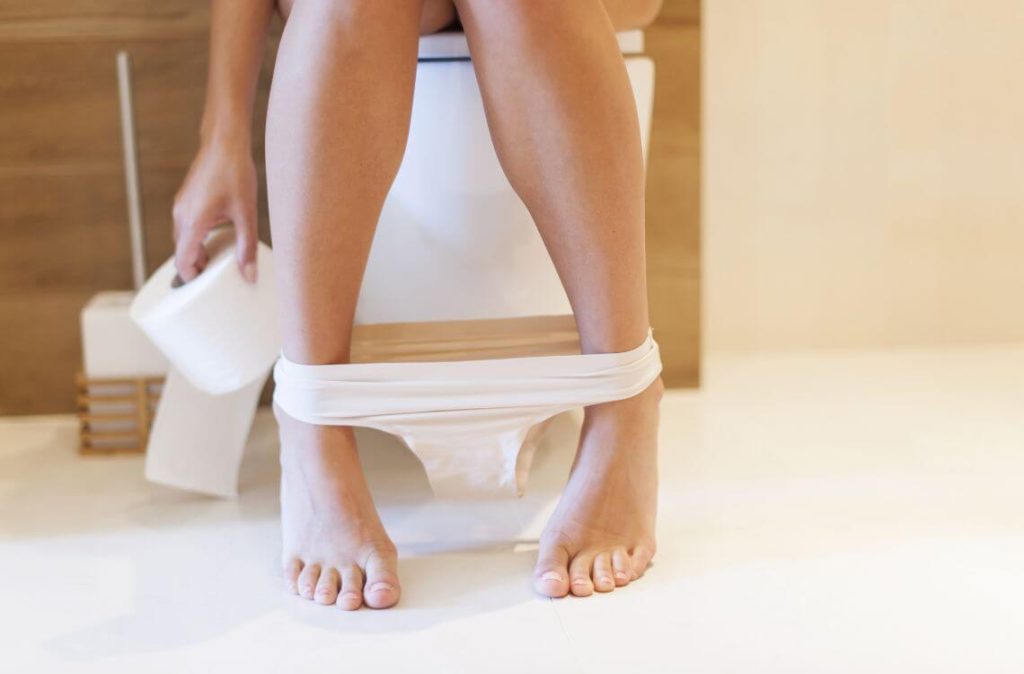You have just given birth to your baby and probably are in a whirlwind of emotions.
It might be a good idea to put yourself first for a while before diving into motherhood.
Delivering a baby is no small feat and your body is recovering.
It can be a little scary to think of having to go to the bathroom and something that might be looming over you right now is your first postpartum poop.
What’s Happening
Postpartum poop can seem scary but you can make it easier for yourself.
It is a problem every mother has so do not overthink the situation.
Most mothers have to ‘go’ three to five days after birth.
Some can go on the same day and some a week later.
Your diet, emotions and general physiology all affect this but as long as it doesn’t go over a week you shouldn’t worry about the timing.
Common Concerns
If something happens to go wrong, just know that you aren’t alone and these issues are fixable.
Weakened Muscles
Your pelvic floor muscles go through a lot during childbirth, and they be tired out from all that work.
It’s totally normal to feel as though your abdomen is weak.
This will go back to normal in time as you recuperate.
Once you are feeling better, you can try out Kegel exercises.
Pain
As tiring as it is, your pain might continue past the delivery period.
Stitches, stretching and tears can make postpartum poop incredibly painful.
This will only get worse if you push yourself.
The minute you feel pain, avoid straining so you don’t worsen your already delicate condition.
Constipation
Your body is starting to produce milk in preparation to feed your baby.
More water is absorbed from your colon to meet the requirements and this can dry out your stool.
Constipation in the first few weeks or so is expected, so try to practice some prevention methods beforehand.
Haemorrhoids
Haemorrhoids are swollen veins in and around your rectum that cause a great deal of pain when pooping.
The weight from your uterus on the rectum can be the cause of the swelling.
You can try haemorrhoid cream or using a haemorrhoid donut to ease the pain and cure this complication.
Diarrhoea
Postpartum diarrhoea is rare; as your body want to lose as little water as possible.
This may be a side effect of medication so discuss your symptoms with your Ob/Gyn to figure out the cause of it.
Incontinence
The strain of childbirth can cause tears in your perineum and inner tissues.
Nerve damage from these tears can lead to incontinence.
Over time this nerve damage will heal and you will be back to normal, but you need medical attention so go see a doctor about this condition.
C-Section
A C-section is a major surgery that leaves your body worse for wear.
It is common for it to take some time for your digestive system to go back to normal, and until then you may experience some disruptions.
How to Make It Easier
Eat Well
Your body is going through changes even after the birth of your child.
Eating well will not only decrease chances of constipation, it will keep you nourished and strong enough to handle your new responsibilities.
It is important to have a balanced diet with plenty of fibre and nutrients.
Fibre will ease your bowel issues, particularly constipation. Eating nutrient rich food like spinach and salmon will help you produce the best breastmilk for your child.
Drink Water
It goes without saying that staying hydrated can ease your stomach.
Drinking enough water is not just essential for your health but for your baby’s as well.
Exercise
Getting some movement in your body can help the movement in your bowels.
Short walks and simple exercises will make you more comfortable.
Sitting or lying down for long periods of time can cause a backup in your intestines.
Although it is probably the last thing you want to do right now, getting at least 20 minutes of simple exercise a day can do wonders for your healing body.
Avoid Straining
Whether you have undergone natural delivery or a C-section, you will have gone under a massive amount of stress.
If you strain when going to the toilet, you risk worsening the condition of your pelvic floor or rupturing stitches.
It may be tempting to strain as hard as you can to just get it all out but this can really harm your body.
Medication
Once you start to feel like you need some assistance, contact your doctor to get some stool-softeners.
Medication is always better than pushing through and making your condition worse.
Stool softeners are safe to use and your doctor may give you some when you are leaving the hospital.
However, you should stop using them at any signs of diarrhoea.
When Does It End
Postpartum poop will get easier as you heal.
This period varies in every woman, so it may be worrying if it is taking a long time.
Be patient with yourself and allow your body some time to get better.
It is a long and stressful process but every struggle has an end.
You’ve got this, mummies!
Disclaimer: The information provided in this article is for informational purposes only and should not be considered as medical advice from Motherhood. For any health-related concerns, it is advisable to consult with a qualified healthcare professional or medical practitioner.
For more insightful stories and fun recipes, stay tuned to Motherhood Story!
